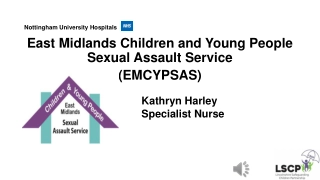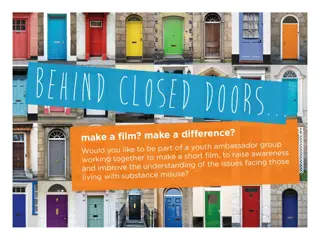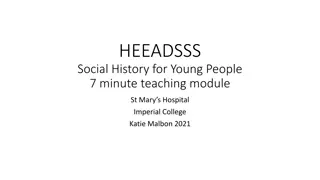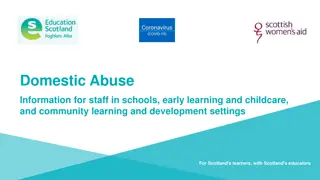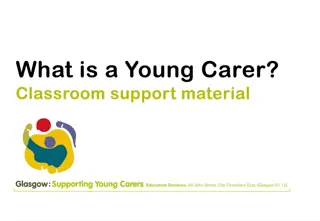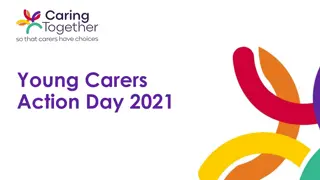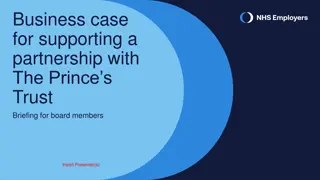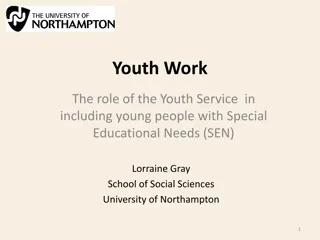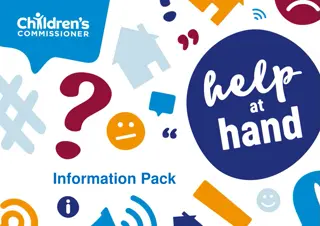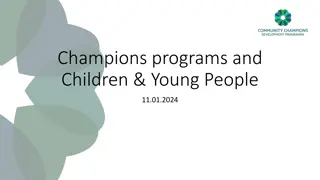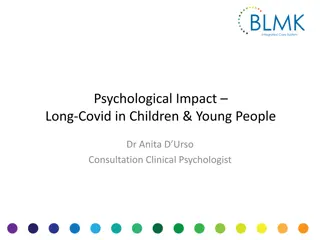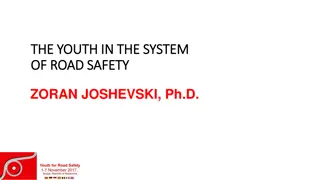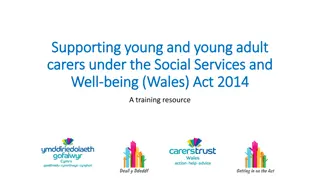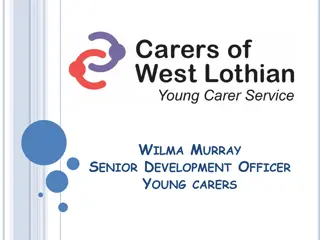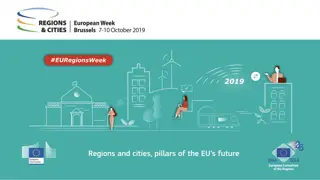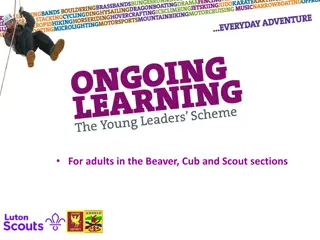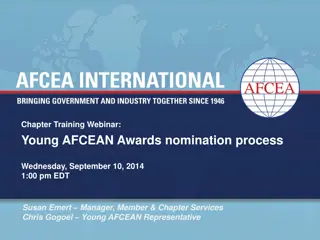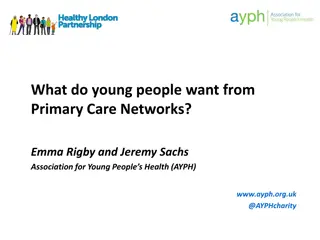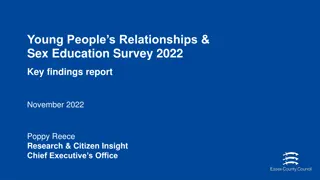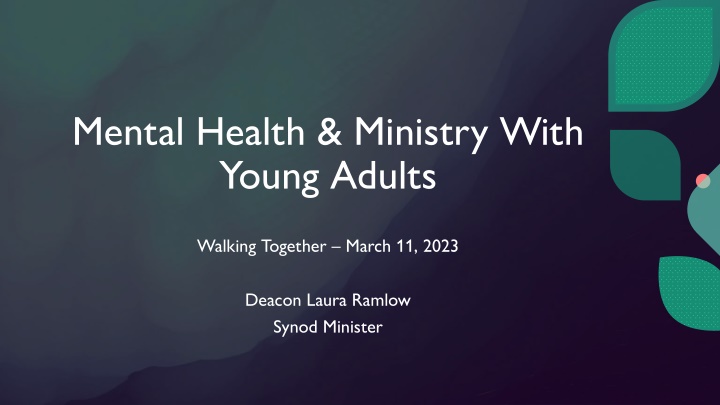
Mental Health Ministry and Youth Support: Building Strong Connections
Explore the intersection of mental health, ministry, and young adults' needs, highlighting the importance of supportive adult figures and addressing the challenges faced by Gen Z during the pandemic.
Download Presentation

Please find below an Image/Link to download the presentation.
The content on the website is provided AS IS for your information and personal use only. It may not be sold, licensed, or shared on other websites without obtaining consent from the author. If you encounter any issues during the download, it is possible that the publisher has removed the file from their server.
You are allowed to download the files provided on this website for personal or commercial use, subject to the condition that they are used lawfully. All files are the property of their respective owners.
The content on the website is provided AS IS for your information and personal use only. It may not be sold, licensed, or shared on other websites without obtaining consent from the author.
E N D
Presentation Transcript
Mental Health & Ministry With Young Adults Walking Together March 11, 2023 Deacon Laura Ramlow Synod Minister
Deacon Laura Ramlow Synod Minister Communication and Digital Engagement Companion Coordinator Malawi, Africa Faith Formation Synod Youth Board Synod Youth Events Cross Generational Ministry Youth Workers Network Introduction
Springtides Objectives Research about the mental health of young people (Gen Z) Insight about Gen Z and their experience with religion and spirituality Tools and options for ministry with young people
Research with 13-25 Year Olds (Generation Z) To help people who care about young people care better About Springtide Research Institute Believe that young people should not have to endure life s tough questions alone
Question: Who was someone in your life who truly saw you understood, encouraged, supported, equipped, and listened to you those golden adults? Describe in one sentence why they meant so much to you as a young person.
How can we become those golden adults for young people?
What we know...Covid created uncertainty. Teens experienced the loss of formative experiences rooted in skill- building and socializing.
+ Graduates who had plans for college or the work force experienced a sudden shift to uncertainty and lack of jobs. + Young people experienced loss of loved ones, or jobs, or watched parents lose jobs
Although the pandemic shook things up for everyone in one way or another, adapting to significant uncertainty is something that most adults have experience with this is not the case for most young people.
For young people, the pandemic years showed them people s values What values were expressed? How did adults respond? What was prioritized, articulated, discussed?
Only 10% of young people said that a faith leader reached out to them during the pandemic. Springtide Research 79% of young people are more likely to listen to an adult in their life if they know they care about them.
Considerations Traditionally, we have the expectation that people, including young adults, show up to us, to our ministries, in our spaces, etc. We may need to consider a new model for ministry with young people if we want them to be a vibrant part of the mission we share. What might change if we reevaluate our current models, and, instead show up in their lives?
Research shows us three significant ways we can care for young people:
#1 Creating Safety Basic psychology tells us that if we don t feel safe, we are unable to adequately process emotion. This helps young people regain their footing when things are unstable, uncertain, or confusing. How can we help young people move from fight/flight/freeze to breathe and be? 74% of young people say they hope to feel safe again when the pandemic is over
#2 Celebrate Whats Been Gained (without insisting on optimism) WHAT SURPRISED YOU ABOUT ABOUT YOUR OWN INNER STRENGTH? WHAT SKILLS DID YOU DISCOVER ABOUT YOURSELF DURING THE PANDEMIC? 57% OF YOUNG PEOPLE EXPECT THAT A LOT WILL BE DIFFERENT POST-PANDEMIC, IN MOSTLY DISAPPOINTING WAYS
#3 Take Care of the Body (To help the body and mind process stress) WHETHER OR NOT YOUNG PEOPLE HAVE ALREADY CHANGED SOME OF THEIR PERSONAL WELLNESS ROUTINES DURING THE PANDEMIC, YOUR MINISTRY CAN INTRODUCE THESE ELEMENTS WALKS, DEEP BREATHS, DECREASING SUGAR AND CAFFEINE INTAKE, DRINKING MORE WATER, ETC.
How does Gen Z currently feel about spirituality & religion?
Since the pandemic, has your faith .. 1.Become stronger (30%) 2.Stayed the same (38%) 3.Become weaker (18%) 4.Lost my faith altogether (8%)
26% say their relationship with faith communities has become weaker since the pandemic. It is true that Gen Z continues to trend away from religious institutions . An online worship community may not be the solution we assume is meaningful for Gen Z
Only 10% of young people found joy in virtual worship While 39% found cooking brought them joy, and they would like to continue practicing this in the future
A completely online worship community would satisfy all my needs: 67% said NO 33% said YES
Despite disinterest in religious services (virtual or otherwise) young people maintained or added other spiritual practices: o Nature 32% o Yoga, Martial Arts 31% o Art 31% o Prayer 50% o Meditation 45% o Reading 42%
47% of young people say they are moderately or extremely depressed 61% of young people agree that the adults in my life don t truly know how much I am struggling with my mental health. Mental health is what young people are struggling people with most Mental health has been regarded as an emergency among young people Mental health-related emergency-room visits increased 24 - 31% among young people since 2020.
How can we incorporate mental health into ministry? If mental health is a personal, ongoing struggle, there can be little to no room for spiritual growth What does all this have to do with the church? For young people of faith, a majority (66%) agree that their religious or spiritual life matters for their mental health
86% of young people do not trust religious institutions Who am I? Where do I belong? What is my purpose?
Faith leaders and communities have an important role to play!
We see low participation and might assume that young people don t want anything to do with the church, spirituality, or religion. Research shows us that s untrue!
Considerations What might it look like to invite a psychologist to come and chat with your group to offer practical advice about addressing mental health concerns as a way to open up this conversation.
What might it look like for your church to incorporate these things into your ministry? 3 top things young people missed most during the pandemic: 1. Contact with friends 2. Eating in restaurants 3. Traveling
Listening is KEY! I can see/hear that you are feeling _______ about ___________; do you want to say any more about that?
Success in Mental Health Empower Equip Engaged

